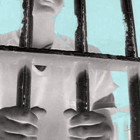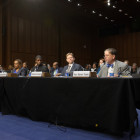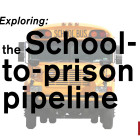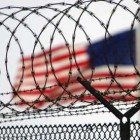
OP-ED: When the Stupidity of Adults Hurts Kids
|
No one should be allowed to possess the authority to act as a parent, but wield a sword of abuse and neglect on those in their charge.
Juvenile Justice Information Exchange (https://jjie.org/tag/school-to-prison-pipeline/page/5/)

No one should be allowed to possess the authority to act as a parent, but wield a sword of abuse and neglect on those in their charge.

The United States imprisons more people than any other country — and a staggering number are juveniles. Sadly, our school system is contributing to the problem. Too many children are denied their right to a quality education and instead set on a path toward failure and incarceration.

During my testimony before the U.S. Senate Judiciary Subcommittee on The Constitution, Civil Rights, and Human Rights last month, Sen. Dick Durbin (D-Ill.), chairman and majority whip, asked me if I am in favor of police on school campuses. To the dismay of some of my friends who stand by my side in this fight to dismantle the "school-to-prison pipeline," I answered a qualified yes. Police on campus, I explained, must be specially trained in adolescent development, crisis intervention and fostering positive relationships with students. Two days later, a deranged shooter entered the campus of Sandy Hook Elementary School in Newtown, Conn. killing 20 children and six adults.

Despite public concerns about youth crime, particularly in schools, research has shown that policies based on incapacitation theory have failed utterly to affect crime rates. In fact, while youth crime rates have fallen significantly over the last 30 years, they have continued to plummet despite recent trends towards community-based alternatives (e.g., the ‘Missouri Model’). The evidence suggests that not only do punitive disciplinary approaches often fail they are also unnecessary. It is particularly troubling, then, to consider the police presence and draconian disciplinary measures that have increasingly found their way into America’s schools. Schools typically have rules forbidding mobile phone use, profanity and the like.

WASHINGTON, D.C. – Twenty-year-old Edward Ward, a sophomore on the honor roll at DePaul University, tried to describe to U.S. Sens. Dick Durbin (D-Ill.) and Al Franken (D-Minn.), the only senators left in the room by the time he spoke on Capitol Hill Wednesday, what it was like to grow up in his neighborhood on the west side of Chicago. “When I was 18, I witnessed a complete stranger's killing mere feet from me in a neighborhood restaurant," Ward said before the Senate subcommittee. "I was stopped by the police a few years ago. I saw them train their guns on me until I could show them the item in my hand was only a cell phone.”
Things didn’t get much better at high school, Ward said.

The U.S. Department of Justice says a school-to-prison pipeline that runs through schools, the city police department and juvenile courts threatens children in Meridian, Miss. The school system is negotiating a new set of rules with the DOJ. The city, county, youth court and state of Mississippi, meanwhile, have just gotten hit with a federal lawsuit, and attention that may have already changed their ways. “We filed this lawsuit because we have to,” said U.S. Deputy Assistant Attorney General Roy Austin, in a public telephone conference on Oct. 25, the day after his department sued the City of Meridian, Lauderdale County, the county Youth Court judges and Mississippi’s Division of Youth Services claiming that the four agencies work together to ignore children’s due process rights and incarcerate them for minor infractions.

The federal Department of Justice (DOJ) is suing the Mississippi county, city and judges who they say systematically ignore youthful defendants’ rights, resulting in a well-beaten path from school to incarceration. “The department is bringing this lawsuit to ensure that all children are treated fairly and receive the fullest protection of the law,” said Thomas E. Perez, assistant attorney general for the DOJ Civil Rights Division, in a written statement on Oct. 24. The suit is being brought against the city of Meridian, Lauderdale County, the two judges of the county Youth Court and the state of Mississippi.“It is in all of our best interests to ensure that children are not incarcerated for alleged minor infractions, and that police and courts meet their obligations to uphold children’s constitutional rights,” he wrote. The DOJ published preliminary accusations against the now-defendants some 10 weeks ago, threatening a lawsuit if the Mississippians did not cooperate.

This story was produced in partnership with the Center for Public Integrity
Meridian is not alone under the DOJ magnifying glass. In a somewhat similar case in Tennessee, the DOJ says the Juvenile Court of Memphis and Shelby County has failed to inform children of the charges against them and of failing to make sure the children know what their legal rights are ahead of questioning. Like Meridian, the juvenile court is also accused of failing to hold timely hearings. There are varying definitions of a school-to-prison pipeline, said Jim Freeman, senior attorney at Advancement Project, a nonprofit legal action group that fights racial injustice. “How I like to define it,” Freeman said, “is the use of policies and practices that increase the likelihood that young people become incarcerated.”
That includes at-school arrests for minor behavioral incidents, as well as what he calls more indirect actions, like suspensions, expulsions or references to juvenile court or alternative schools.

This story was produced in partnership with the Center for Public Integrity
Lionel Townsend will turn 14 in September and a few months after that he will be able to return to school, ending a year of exile. Lionel admits he got into fights multiple times at Magnolia Middle School. When he was charged with vandalizing a school bus security camera, he was booted from school. He fought again in a community day program. The county Youth Court eventually put him on probation and an order to stay at home with an ankle monitor.

In recent years, juvenile justice advocates, lawyers, policy-makers, and reformers have increasingly sought to raise awareness of the American phenomenon of the “school-to-prison pipeline.”
The term refers generally to the process in which substandard public schools fail to provide adequate support and resources for at-risk children and their families, resulting in high drop-out rates and ultimately leading to court-involvement, detention and incarceration. More specifically, the term refers to the pattern in which students who have committed school-based wrongdoing — whether by pushing another child in the hallway, taking a pencil from a teacher’s desk, or disrupting class — are summarily arrested, charged with violating a criminal offense, and prosecuted in juvenile delinquency court. After a judge finds them delinquent, youth are then placed on probation and court-ordered to comply with a long series of conditions, typically including that they not be suspended (or not be suspended again) from school. In many jurisdictions when a juvenile on probation is suspended — even for a minor infraction at school — the consequences of the violation may include incarceration in a detention center. Research has shown that youth who are disproportionately impacted by the school-to-prison pipeline are likely to be those who are already the most vulnerable: low-income students, children of color, English language learners, youth in foster care, students with disabilities (whether physical, psychological, or developmental), and homeless children.